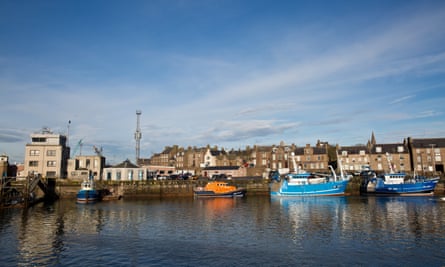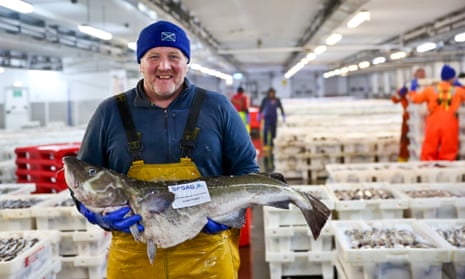Fish and chip lovers can now enjoy North Sea cod with a clear conscience, after the fishery was awarded sustainable status by the Marine Stewardship Council on Wednesday.
Stocks of cod in the North Sea were once one of the world’s great fisheries but plummeted by 84% between the early 1970s and 2006. They came perilously close to the total collapse seen in the Grand Banks fishery off Canada in the early 1990s, which has still not recovered.
But action to decommission fishing boats, ban catches in nursery areas and put larger holes in nets to allow young cod to escape has seen the stock rise fourfold since 2006. The MSC, a non-profit certification group, undertook a detailed 18-month study and has now approved the North Sea cod catch of 228 boats in Scotland and England, which represents the vast majority of the white fish fleet.
Sustainable North Sea cod will carry the MSC’s blue label and is expected in supermarkets as early as next week, with Waitrose likely to be among the first to offer the fish. North Sea cod has never been approved by the MSC in the group’s 20-year history and the MSC certification also requires fishers to protect cold water corals from damage by trawlers.
Currently, about 90% of cod in the UK is imported, mostly from Iceland and from Norwegian and Russian boats fishing in the Barents Sea, which have all gained MSC sustainability certification in recent years.
But now cod caught and landed in the UK will also be labelled sustainable. UK citizens eat about 70,000 tonnes of cod a year – 1kg per person – and the proportion of UK cod consumed is now expected to rise. Industry group Seafish estimated there are over 10,000 takeaway fish and chip shops in the UK, serving about 380m meals a year.
The UK fleet has been given a five-year approval from the MSC, subject to annual checks. The fleet will also have to adapt to new EU rules banning the discarding of bycatch – dead fish for which the fishermen have no landing quota – and the change of management regime after the UK leaves the EU.
The future of fisheries management has been a high profile part of the Brexit debate, with many fishermen arguing that taking control of UK waters would mean more fish for UK boats and better management. However, conservation groups have warned against diluting environmental protection and recent improvements to the common fisheries policy.
James Simpson, from the MSC, said the North Sea cod stocks have just recently reached a sustainable level. “You can literally keep on fishing forever,” he said, if the protections against overfishing are maintained. This sustainable stock level is about 40% of the total estimated to once have been present.
Fisheries minister George Eustice said: “The UK has played a leading role in the recovery of North Sea cod stocks and it’s great news that this iconic species has been certified and recognised as sustainable seafood. As we prepare to leave the EU we have an opportunity to improve how we manage fish stocks in our waters.”
The action that brought North Sea cod back from the brink hit fishing communities hard, with many boats taken out of service and fishing days limited. Mike Park, chair of the Scottish Fisheries Sustainable Accreditation Group, said: “This [new accreditation] is a massive development for the catching sector and is a testament to the power of collective action. The years of commitment to rebuilding North Sea cod has shown that fishermen are responsible and can be trusted to deliver stable and sustainable stocks.”

Lyndsey Dodds, head of UK marine policy at WWF, agreed that the improvement in cod stock showed what was possible when the fishing industry, managers and scientists worked together. But she said: “The amount of North Sea cod at breeding age is well below late 1960s levels and recovery remains fragile. If we’re to get North Sea cod back on British plates for good, it’s vital that we don’t lose focus on sustainably managing fish stocks and protecting the marine wildlife as the UK develops its post-Brexit fisheries policy.”
The MSC hope their new accreditation for North Sea cod will help end the confusion some UK shoppers felt about the sustainability of cod. A 2015 survey found 28% of people thought cod was not sustainable and should not be eaten, while an equal proportion though the opposite.
Another sustainability scheme run by the Marine Conservation Society currently rates North Sea cod as not sustainable, but this rating is currently under review and could be changed within a month or two. In March, the MCS removed UK haddock from its sustainable seafood list.

Comments (…)
Sign in or create your Guardian account to join the discussion